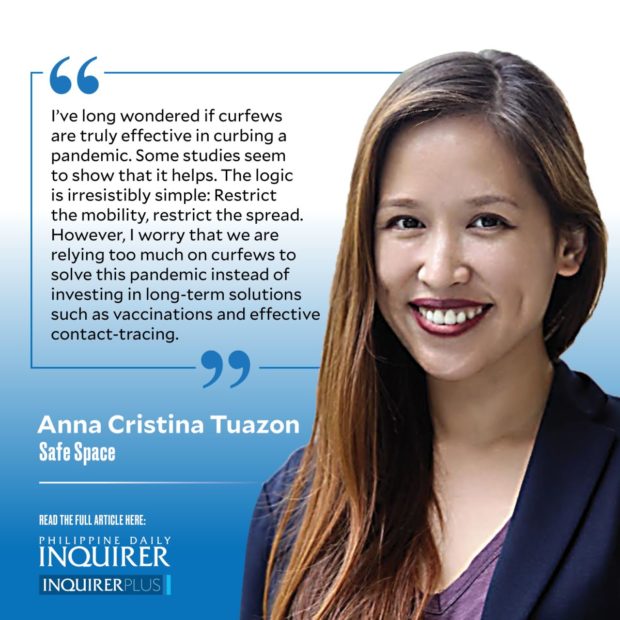Overuse of curfews
Metro Manila has once again extended its curfew hours from 10 p.m. to 4 a.m. after it was placed under general community quarantine with heightened restrictions. I’ve long wondered if curfews are truly effective in curbing a pandemic. Some studies seem to show that they help. The logic is irresistibly simple: Restrict the mobility, restrict the spread. However, I worry that we are relying too much on curfews to solve this pandemic instead of investing in long-term solutions such as vaccinations and effective contact-tracing. The numbers might go down for a few days (if at all, since I doubt that 10 p.m. is the prime time for virus exposure) but curfews cannot hold for too long. They are a temporary solution at best and a futile exercise at worst.
This reminds me of banning and curfew practices in parenting — and why I encourage parents to let them go. To be clear, setting limits are good and healthy. Children need to learn how to work within boundaries. But limits need to be reasonable for the child and not merely convenient for the parent. There has to be a solid rationale behind any rule that we make if we want children to respect it. The “because-I-said-so” approach to parenting is frankly only effective for children under two years of age. If you cannot explain the rule well, then you probably need to rethink the rule to begin with. Most people are only “pasaway” if they don’t see the merits of your rule.
Curfews also need to be flexible. I have seen parents insist on bedtime curfews even when the child is not yet done with their homework, leaving the child not knowing what to do. When rules are not reasonable or flexible, we get incidents like the “lugaw is essential” fiasco or where the punishment, such as forcing people into crowded cells, actually increases risk of exposure that the rule was trying to prevent in the first place.
Bans should be used even more sparingly. Children do not learn anything from a ban except to label things as only either “good” or “bad,” an overly simplistic cognitive strategy that prevents them from developing critical thinking. It makes sense though why some cannot resist banning gadgets, shows, or activities. It requires way more energy to get to know the games that they play and the shows that they watch and to have to explain context to their child. In pandemic terms, it is way easier to impose a lockdown than to invest in more nuanced multi-pronged strategies.
Bans also have a counterintuitive effect. Overly strict parents raise sneaky kids. I remember how my friends would laugh at the seemingly absurd logic of parents and their paranoia about nighttime activities. It’s not as if sex and alcohol can only happen at night (just like how the Tokyo Olympics organizers intentionally created flimsy beds to prevent “non-sleep” activities, as if sex can only happen on beds). Forbidding something also increases the desirability and attractiveness of that object. The prohibition led to the proliferation of the speakeasy; martial law curfews led to stay-in parties.
Imposing a ban without providing viable alternatives is also unjust. Taking away gadgets and devices from children, for example, at a time when they are the only connection to their friends is cruelly isolating. It sends an invalidating message that their social needs are not important. Banning public transport also proved terribly unjust to people with no other alternatives. It led many to be stranded and having to walk for hours just to get to work. Government admonishes toward creative alternatives (such as when Pasig City hired tricycles as transport for essential workers or when community pantries were created to address the heightened food insecurity brought about by not being allowed to work) only show a stubborn single-mindedness to prevent virus spread without regard to wellbeing. Instead of relying solely on curfews and lockdowns, how about ensuring that all essential services have contact-free alternatives? Numerous government processes and programs still require in-person appearances. Appointment times aren’t honored properly, creating unnecessary crowds and lines. Generate income alternatives for jobs that were displaced by restrictions. Give us less reasons to have to go out. Don’t just lock us in.





















